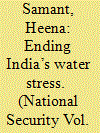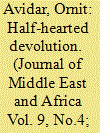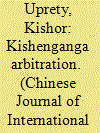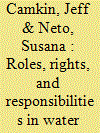|
|
|
Sort Order |
|
|
|
Items / Page
|
|
|
|
|
|
|
| Srl | Item |
| 1 |
ID:
133768


|
|
|
|
|
| Publication |
2014.
|
| Summary/Abstract |
Over the years, China's Lancang dam cascade has been the target of widespread contestation arising mainly from an evolving network of dam opponents. Operating across borders, these activists play an increasingly prominent role in the transboundary governance of the Lancang-Mekong River, working to curb China's hydropower expansion and hold its dam developers to account.
|
|
|
|
|
|
|
|
|
|
|
|
|
|
|
|
| 2 |
ID:
186238


|
|
|
|
|
| Summary/Abstract |
India is facing water distress in both quality and quantity. This is expected to worsen if urgent all-round remedial measures being taken prove to be inadequate. Water shortages, pollution, overuse and significant wastage, low to no water pricing, floods in monsoon when water is abundant, among others, characterise the prevailing situation in parts of the country. Several factors, such as exponential population growth, rapid urbanisation, industrialisation, antiquated infrastructure, and inadequate water governance, can be credited for this plight. There are major reforms and changes underway that raise hopes for a more secure future. The Government has made ‘water governance’ one of the main priorities in its policies and decisions, and significant advances in overcoming water related challenges are being made. Despite these measures, a crisis could still be inevitable due to the challenges posed by climate change. India needs to make its people conscious of the finite nature of water and the utmost need to avoid waste and overuse. They need to learn to nurture, conserve, reuse, and recycle this invaluable resource of nature.
|
|
|
|
|
|
|
|
|
|
|
|
|
|
|
|
| 3 |
ID:
163737


|
|
|
|
|
| Summary/Abstract |
Decentralization in countries around the world occurred as a form of structural revolution in redistribution of power in the 1980s and 1990s. In 2010, Kenya too went through a fundamental reform in which a new constitution was promulgated, which put into place a devolved system of government. This structural revolution has directly affected issues related to water governance in Kenya, but reflects similar trends and changes established internationally. This article reviews the devolution process in Kenya and its consequences. It delves into water legislation from the perspective of devolution and analyzes how devolution functions and objectives were formed with the new regulations. Finally, this study analyzes how policies and their ramifications are manifested on the ground in Siaya County in Western Kenya. The author applies mixed methodical methods of document review of the Constitution of Kenya 2010 and of the Water Acts 2002 and 2016 as well as open-structured interviews with relevant stakeholders and observations conducted in Siaya County on two field trips between July 2017 and February 2018. A close examination of the impact of devolution on the sustainable access to clean water in Siaya County will demonstrate that the transition to devolution and compliance with the 2016 Act have led to the surfacing of a host of problems including inadequate governance.
|
|
|
|
|
|
|
|
|
|
|
|
|
|
|
|
| 4 |
ID:
159842


|
|
|
|
|
| Summary/Abstract |
Despite being known as “Asia's water tower,” Yunnan frequently experiences severe droughts which put pressure on local communities and state actors alike. This article examines the institutional arrangements that guide water governance strategies employed by local cadres in Yunnan province, showing how central control mechanisms in the Chinese administrative system undermine effective water governance at the local level. Findings obtained from field research in two counties in Yunnan with different levels of economic development and water resource access show that current institutional arrangements – including those regulating local cadre performance and the procedures to apply for project funding from higher-level governments – hinder the efficient use of infrastructure investment. Instead, provincial and prefectural water bureau officials use their authority to channel funding to those regions with an already positive track record of project applications.
|
|
|
|
|
|
|
|
|
|
|
|
|
|
|
|
| 5 |
ID:
088931


|
|
|
|
|
| Publication |
2009.
|
| Summary/Abstract |
In the first decade of the 21st century, 'hydrosolidarity,' the notion that water management should include considerations of ethics and equity, has influenced international approaches to conducting environmental research and formulating water policy. Since its inception in the 1990s, the term appears frequently across a spectrum of water-related research. It has accordingly permeated discourses and publications on water management. Such rapid proliferation of the concept has helped usher in a wave of transition from conflict management to cooperative efforts between upstream and downstream basin users, as well as a complex paradigm that links both human and environmental welfare. In this paper, we trace the intellectual origins and changing conceptions of hydrosolidarity. We outline some of its applications as well as various reactions to the concept. We close by discussing how the concept can help frame negotiations between riparian states and influence treaty-making and institution-building in river basin settings.
|
|
|
|
|
|
|
|
|
|
|
|
|
|
|
|
| 6 |
ID:
141484


|
|
|
|
|
| Summary/Abstract |
Treaties pertaining to international waters are difficult to implement, often leading to disputes over the unexpected interpretation of their provisions. These disputes generally revolve around the issues of water governance, management and sharing, and environmental concerns, and in many cases, call for the intervention of international tribunals and bodies to resolve them, with the multiple objectives of breaking the tension, appeasing the parties, averting further deterioration of problems, and recommending a mechanism for good-faith implementation of such treaties.
|
|
|
|
|
|
|
|
|
|
|
|
|
|
|
|
| 7 |
ID:
164416


|
|
|
|
|
| Summary/Abstract |
More so than for other countries, the management of China's water resources is an important aspect of its policy and politics, yet existing scholarly attempts to understand this importance are scattered among a wide range of sub-literatures that lack a unifying theoretical framework. This article attempts to identify common themes and features of the relationship between water, politics and governance in contemporary China by examining how this relationship has unfolded in historical perspective. It identifies three basic objectives that have shaped the politics and governance of China's water resources over time: legitimacy, economic development and environmental sustainability. These objectives map, though imperfectly, onto different periods in the history of the People's Republic of China, thereby highlighting how they have evolved. Together, these objectives explain policies towards, and the politics of, water resources in contemporary China. This understanding shows that water both shapes and reflects Chinese politics, and highlights the need for a theoretically coherent sub-literature on Chinese water policy and politics.
|
|
|
|
|
|
|
|
|
|
|
|
|
|
|
|
| 8 |
ID:
152527


|
|
|
|
|
| Summary/Abstract |
In the past two decades spaces for user participation have been opened within water governance structures at many scales. In this contribution, based on a case study of the Provincial Water Users Federation Interjuntas-Chimborazo in the Ecuadorian Highlands, I explore how and why formal participation of water users in itself is problematic in terms of democracy. The case shows that for organised peasant water users to work on more democratic water governance, the creation of upscaled federations, alliances, networks and sometimes street protests is crucial to open up spaces in which their interests are represented. This suggests that democracy is not merely about participation, but more importantly, it is about the politics of how democracy is made through conflicts, protests, negotiations and the creation of strategic alliances that challenge the structures and processes through which decisions are taken.
|
|
|
|
|
|
|
|
|
|
|
|
|
|
|
|
| 9 |
ID:
154419


|
|
|
|
|
| Summary/Abstract |
Numerous commentators have highlighted the criticality of improving water governance to help address current and future water challenges. But whose job is it? In water governance, what should we expect from our governments? What should commercial water users expect from each other? What changes should environmental and social advocates expect as a result of their representations on behalf of stakeholders who have little or no voice? And what should governments expect from the communities they serve? This article briefly examines the rights and responsibilities of various actors in water governance through a selection of key water issues. We suggest that discussions about water are often unbalanced, overemphasizing the rights of large water users and underemphasizing the responsibilities all parties have toward achieving effective and efficient water governance. Among all the responsibilities in water governance, none is more fundamental than our shared responsibility toward intergenerational equity. This shared responsibility can and should be the rallying point around which we gather to improve water decisions at all scales, from local streams to national policies and global agreements.
|
|
|
|
|
|
|
|
|
|
|
|
|
|
|
|
| 10 |
ID:
174830


|
|
|
|
|
| Summary/Abstract |
Viewing the Salween River as a transboundary commons, this paper illustrates how diverse state and non‐state actors and institutions in hybrid and multi‐scaled networks have influenced water governance in general, and large dam decision‐making processes in particular. Putting power relations at the centre of this analysis and drawing on the conceptual lenses of hybrid governance and critical institutionalism, we show the complexity of the fragmented processes through which decisions have been arrived at, and their implications. In the context of highly asymmetrical power relations throughout the basin, and the absence of an intergovernmental agreement to date, we argue that hybrid networks of state and non‐state actors could be strategically engaged to connect parallel and fragmented decision‐making landscapes with a goal of inclusively institutionalising the transboundary commons and maintaining connected local commons throughout the basin, foregrounding a concern for ecological and social justice.
|
|
|
|
|
|
|
|
|
|
|
|
|
|
|
|
| 11 |
ID:
085326


|
|
|
|
|
| Publication |
2008.
|
| Summary/Abstract |
With increasing recognition of a global crisis in water resources, it becomes relevant to ask whether existing legal systems can make serious contributions to the management of the earth's water resources. This article examines the evolution of national water law and its key features, the coevolution of international water law, and a new focus in the twenty-first century to develop global water law against a backdrop of growing pluralism in water governance. In the past, national and international water law has generally reflected prevailing social beliefs and state practice rather than shaped them. However, contemporary developments in national and international water law suggest that an emergent global law is increasingly shaping practice instead of merely reflecting it. This global law seeks proactively to influence future water management, rather than being limited by past decisions.
|
|
|
|
|
|
|
|
|
|
|
|
|
|
|
|
|
|
|
|
|